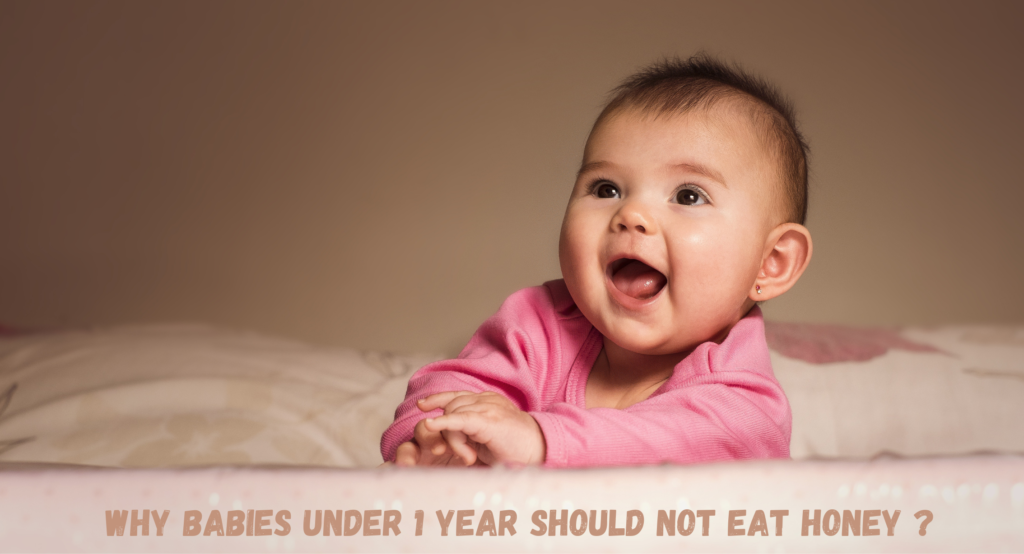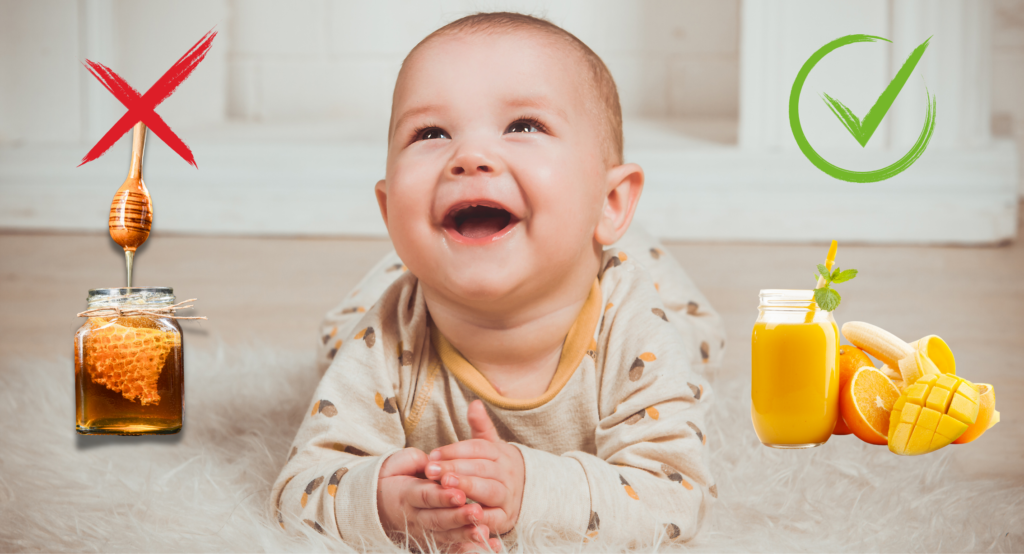
Why Babies Under 1 Year Should Not Eat Honey ?
Honey is often considered a natural superfood packed with antioxidants and nutrients. However, why babies under 1 year should not eat honey is a crucial topic that every parent must understand. Pediatricians and health organizations, including the Centers for Disease Control and Prevention (CDC) and the American Academy of Pediatrics (AAP), strongly advise against giving honey to babies under 12 months. The reason? A rare but potentially fatal condition called infant botulism.
Why Babies Under 1 Year Should Not Eat Honey: The Primary Concern
Honey can contain Clostridium botulinum spores, a type of bacteria found in soil, dust, and raw foods. While harmless to older children and adults, a baby’s immature digestive system lacks the necessary gut bacteria to fight off harmful toxins.
When ingested by an infant, these botulinum spores can germinate in the intestines, producing dangerous toxins that affect muscle function and the nervous system. If untreated, infant botulism can lead to severe complications, including paralysis and respiratory failure. This is the primary reason why babies under 1 year should not eat honey under any circumstances.
How Infant Botulism Occurs
To better understand why babies under 1 year should not eat honey, here’s how infant botulism develops:
1️⃣ Botulinum spores present in honey enter the baby’s digestive system.
2️⃣ Since an infant’s gut lacks protective bacteria, the spores multiply and produce botulinum toxin.
3️⃣ The toxin blocks nerve signals, leading to muscle weakness, breathing issues, and other severe symptoms.
This condition is life-threatening, making it essential to completely avoid honey for babies under 1 year.
Symptoms of Infant Botulism
If a baby accidentally consumes honey, symptoms of infant botulism can appear within 3 to 30 days. Early detection is crucial, as prompt medical treatment can prevent complications.
Warning Signs to Watch For:
🔸 Constipation – Often the first noticeable symptom.
🔸 Weak suckling and difficulty feeding.
🔸 Lethargy or excessive drowsiness.
🔸 Weak crying or difficulty making sounds.
🔸 Floppy movements (low muscle tone) and muscle weakness.
🔸 Drooping eyelids or facial weakness.
🔸 Breathing difficulties, which may lead to respiratory failure.
If you notice any of these symptoms, seek IMMEDIATE medical attention. Infant botulism can be treated with botulism immune globulin (BIG-IV), but early intervention is critical. This is why why babies under 1 year should not eat honey must be a rule followed by all parents.
Why Older Children and Adults Can Eat Honey Safely

Once a child turns one year old, their digestive system is fully developed with enough gut bacteria to neutralize botulinum spores before they can grow and produce toxins.
This is why honey is completely safe for older children and adults, but why babies under 1 year should not eat honey remains a serious health concern. Even small amounts of honey in baby food, formula, or homemade remedies should be strictly avoided.
Other Sources of Botulism Spores
While honey is the most common source, botulism spores can also be found in:
❌ Soil and Dust – Babies can inhale or ingest spores from the environment.
❌ Improperly Canned or Fermented Foods – Especially home-canned vegetables or unpasteurized foods.
❌ Corn Syrup – Although rare, some corn syrups may be contaminated with botulinum spores.
To minimize risk, ensure proper food handling, cooking, and storage for all baby foods. This is another reason why babies under 1 year should not eat honey, as it’s difficult to guarantee purity.
Safe Alternatives for Sweetening Baby Food

If you want to add natural sweetness to your baby’s meals, try these safe and healthy options instead of honey:
✅ Mashed Bananas – Naturally sweet and packed with potassium.
✅ Applesauce (Unsweetened) – Provides fiber and a mild sweetness.
✅ Pureed Fruits – Mango, pears, and peaches add delicious natural sugar.
✅ Breast Milk or Formula – The best and safest natural sweetener for infants.
Avoid:
🚫 Honey (Raw or Processed)
🚫 Maple Syrup (May contain similar bacteria)
🚫 Artificial Sweeteners (Aspartame, Sucralose)
Stick to whole, natural fruits for the safest and most nutritious choice. As a parent, understanding why babies under 1 year should not eat honey can help prevent life-threatening risks.
When Can Babies Start Eating Honey?
Babies can safely consume honey after their first birthday, when their digestive system is strong enough to neutralize botulinum spores. Once they turn one year old, you can introduce honey in small amounts, watching for any allergic reactions.
🌟 Tip: Start with pasteurized honey, as it is safer than raw honey. However, it is still crucial to remember why babies under 1 year should not eat honey, no matter how processed or refined it appears.
Final Thoughts on Why Babies Under 1 Year Should Not Eat Honey
🚨 Honey is a BIG NO for babies under 12 months.
Despite its natural health benefits, honey poses a serious risk of infant botulism, a rare but dangerous illness that can lead to muscle paralysis and breathing issues. The safest approach? Completely avoid honey in all forms until your baby turns one year old.
Instead, opt for natural fruit purees as a safe and nutritious alternative. And if you have any concerns about your baby’s diet, always consult a pediatrician for expert guidance.
Your baby’s health and safety come first! 👶💛
Sattvanik Honey is dedicated to bringing you 100% pure, raw, and unprocessed honey, directly sourced from beekeepers. Our honey is free from preservatives, artificial flavors, or any form of adulteration, ensuring that you get the most nutritious and authentic honey.
🌸 Varieties of Sattvanik Honey
We offer four premium varieties of flower honey, each with unique flavors and health benefits:
✅ Lychee Honey – Light & fruity, rich in antioxidants
✅ Ajwain Honey – Herbal & medicinal, supports digestion
✅ Fennel Honey – Sweet & aromatic, boosts immunity
✅ Multiflora Honey – A blend of nectar from various flowers, full of essential nutrients
🐝 Why Choose Sattvanik Honey?
✔ 100% Raw & Natural – Directly sourced from beekeepers
✔ No Added Sugar or Preservatives – Completely pure
✔ Rich in Nutrients – Full of vitamins, minerals, and antioxidants
✔ Lab-Tested for Quality – Guaranteed purity
Sattvanik Honey is not just a sweetener; it’s a natural superfood that supports health, immunity, and overall well-being.
Frequently Asked Questions (FAQs)
🔹 Can babies have cooked or baked honey?
No. Cooking or baking honey does not destroy botulinum spores, so it is still unsafe for babies under 1 year old.
🔹 Is organic or raw honey safer for babies?
No. All types of honey, including raw, organic, or pasteurized, can contain botulinum spores. Avoid them completely for infants.
🔹 What should I do if my baby accidentally ate honey?
Monitor for constipation, weakness, or difficulty feeding and seek immediate medical help if any symptoms appear.
🔹 Can breastfeeding mothers eat honey?
Yes! Botulinum toxins are not passed through breast milk, so mothers can safely consume honey while nursing. 😊



